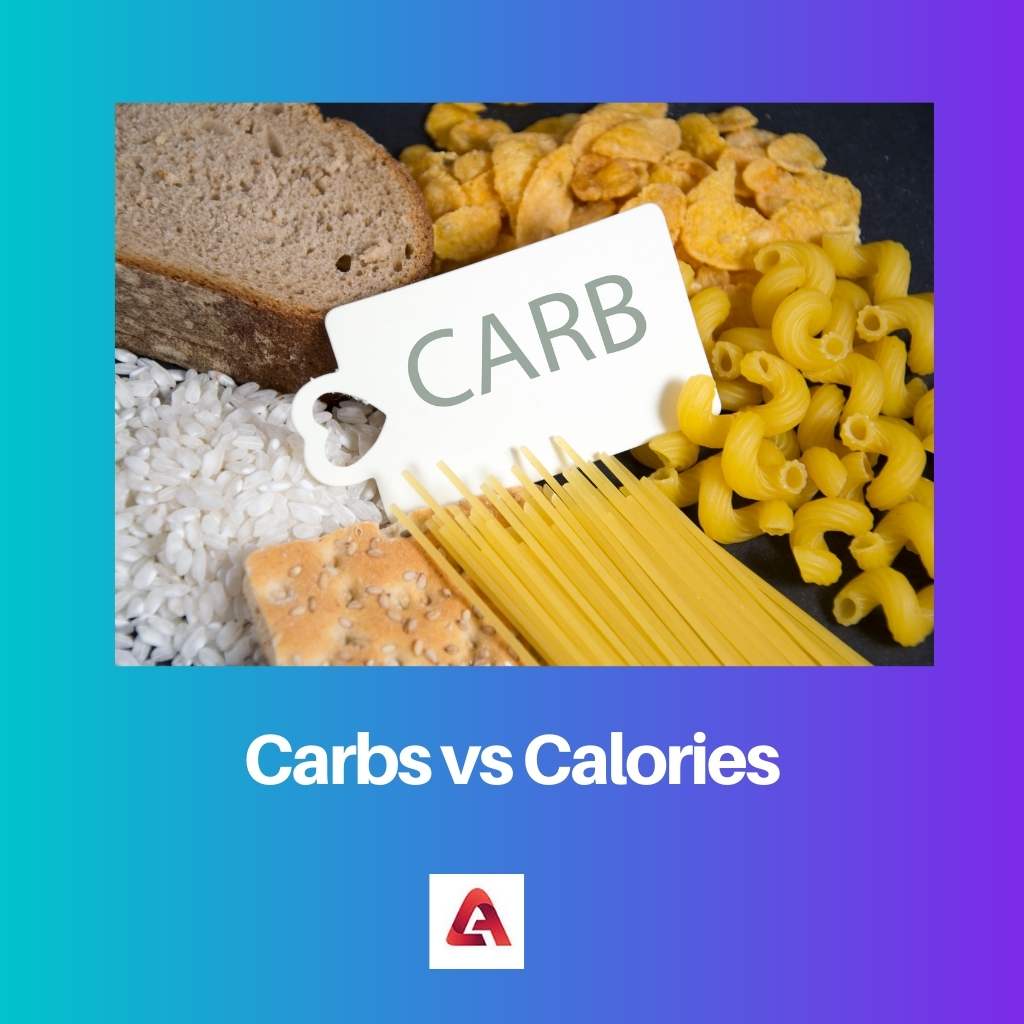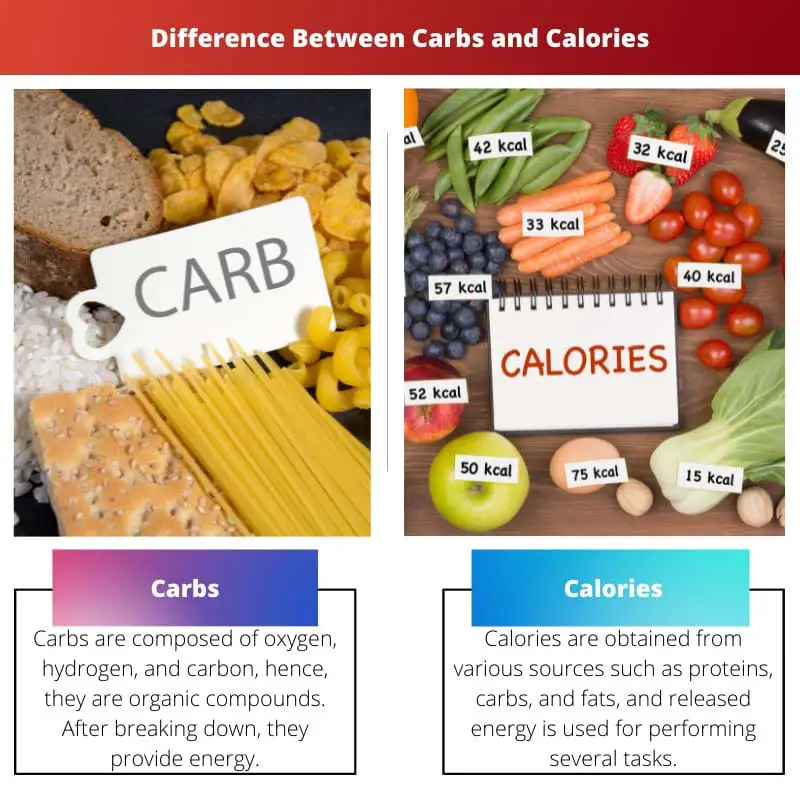A healthy diet includes the required amount of carbs and calories in its diet. On the journey to weight loss, many people take only an ample amount of carbs and calories. Thereby losing weight.
Likewise, during weight gain, people need to maintain their carbs and calorie intake for better results.
Food contains nutrients, macronutrients, calories, etc. They are necessary for the processing and working of our body. Calories act as units of energy, whereas Carbs are macronutrients.
Key Takeaways
- Carbs are a macronutrient that provides energy, while calories are a unit of measurement for energy.
- Carbs can come from sources like fruits, vegetables, and grains, while calories can come from any food.
- Consuming too many calories can lead to weight gain while consuming too many carbs can lead to high blood sugar levels.
Carbs vs Calories
The difference between carbs and calories is that carbs are macronutrients present in the specific food, whereas calories are used as a measurement of energy provided by the specific food. Calories come from different sources, such as proteins, carbs, and fats. So, Carbs provide a specific amount of energy to the consumer, while calories indicate the energy processed by that particular food.

Carbs are macronutrients that are organic compounds composed of oxygen, carbon, and hydrogen-based on chemical composition. Its main work is to break down and provide energy to the body for mechanisms and tasks.
Besides, being an extensive category of food that includes sugar, starch, cellulose, and dietary fibre.
Calories are a means of measurement of energy provided by a particular food. A certain amount of calories is required for every task.
So, To be healthy and fit, an ample amount of calories need to be maintained by the consumer to maintain it. Calories indicate the nutritional information contained by that particular food item.
Comparison Table
| Parameters of comparison | Carbs | Calories |
|---|---|---|
| Refers | Carbs are a type of macronutrient | Calories are a unit of measurement of energy |
| Definition | Carbs are composed of oxygen, hydrogen, and carbon, hence, they are organic compounds. After breaking down, they provide energy. | Calories are obtained from various sources such as proteins, carbs, and fats, and released energy is used for performing several tasks. |
| Source | Carbs are obtained from a diet enriched with carbs. | While calories are obtained from various sources proteins, carbs, and fats. |
| Role | Carbs release energy for our body to work. | Calories maintain the metabolism rate and functions of our body. |
| Found | Cereals, potatoes, noodles, fruits, bread | Peanut butter, candy bars, fried foods, and processed meats. |
What is Carbs?
Carbs are macronutrients present in the food that gives energy to the body. Many macronutrients are present in the foods, such as protein, carbs, and fats.
The composition of the carbs is oxygen, carbon, and oxygen. Its significant work is to provide energy after breaking down, thereby used for further tasks and mechanisms.
Carb is an extensive category in which many food items are included, such as sugar, starch, cellulose, and dietary fibre. It may be present in healthy as well as unhealthy food.
Rather than limiting the number of carbs, the quality of carbs is not good. Focusing on the quality of carbs will help in maintaining a diet more. Refraining from an unhealthy source of carbs will make you healthier.
However, Carbs are not an essential part of a healthy diet. But, it significantly is a critical component of the diet as it gives energy for further tasks and mechanisms.
Carbs are a significant portion of a balanced diet. It does not cause obesity, however, consumption of unhealthier sources of carbs may result in obesity due to quality.
Maintaining the quality of the carbs is necessary as it affects the body directly. Therefore, in a balanced diet, carbs quality and quality both need to be maintained.

What is Calories?
Calories are units of measurement for energy provided by a specific food item. It lists all the nutritional values as well.
A certain amount of calories are required by individuals to perform tasks. But, if you exceed the limit of calories, it may result in obesity or other problems.
Food’s nutritional value is not only based on the calorie count. But, its nutritional value is based on the composition of the food if the food does not contain any vitamins, minerals, fibres, or proteins.
Then it is a nutrient-dense product. It only contains calories but no other nutritional value. Different macronutrients provide different amounts of calories. Protein and carbs provide half more calories than fat.
That’s why many people restrict fat in their diet as the number of calories provided by the fat. In contrast, some fats are required for good health. Dietary recommendations propose a specific calorie range.
The number of calories is affected by age, metabolism, work, etc. So, to work efficiently, a certain amount of calories are consumed by an individual. Even during weight loss, a certain amount of calories need to be consumed.
But they have to burn some calories to lose some weight. The most important thing to remember when losing weight is to burn more calories while eating a specific quantity of calories.

Main Differences Between Carbs and Calories
Carbs and Calories are vastly different. But both are the main component of a balanced diet. A balanced diet needs to maintain some carbs as well as calories to be healthy.
- Carbs are a type of macronutrient, whereas calories are a unit of measurement.
- Calories release a specific amount of energy, whereas calories can be obtained from various sources such as proteins, carbs, and fats.
- Calories are composed of oxygen, carbon, and hydrogen, therefore they are organic compounds, Whereas calories are energy released by the specific food.
- Calories come from various sources, such as proteins, carbs, and fats, whereas carbs come from a diet enriched with carbs.
- Carbs’ significant role is to provide energy to perform tasks, while calories’ main role is to maintain the metabolic rate and functions of the body.


This is a really informative article! Thanks for sharing these amazing insights on carbs and calories!
I totally agree, James81! The detailed comparison between carbs and calories is extremely helpful.
I appreciate the clear comparison table between carbs and calories. It makes it so much easier to comprehend the differences.
It’s fascinating to know how much of an impact the quality of carbs can have on our health. Thank you for explaining this so clearly.
The breakdown of what carbs and calories are and their roles in our body is quite enlightening. Well-written article!
Absolutely, the information provided here is essential for anyone looking to make healthier dietary choices.
I couldn’t agree more, Jonathan Williams. This article is a great resource for understanding nutrition.